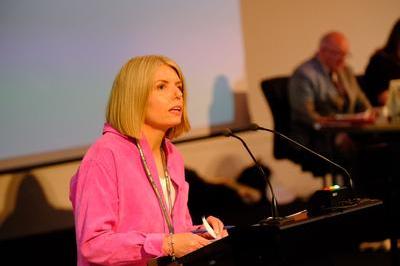DM2023: Ireland
Delegates voted on motions about bogus self-employment, using money saved by zero-rated VAT on newspapers to support journalists, and to back the recommendations of the High Level Working Group on Collective Bargaining.
Conference supported motions calling for a campaign for stronger legislation on bogus self-employment in Ireland and for the Irish Executive Council (IEC) to lobby for the savings made from the new zero-rated VAT on newspapers to be invested in editorial resources.
The IEC’s motion welcomed the significant strides made by the Irish public service broadcaster, RTÉ, in tackling the issue of bogus self-employment, but said this scourge remains, and has adverse consequences in terms of promotion and opportunities particularly for women workers in receipt of maternity allowances and those with carers allowances.
Following pressure from the NUJ, the law company Eversheds carried out a review of RTÉ and its 2018 report found that up to 157 of its employees could have been wrongly classified as self-employed, missing out on a range of benefits as a result.

Conference heard from Éanna Ó Caollaí, one of those who was affected, and Cearbhall Ó Síocháin (pictured), for the IEC, said: “While the reveiw went a long way to deal with the problem, there are still many people who have not been compensated for the period they were denied benefits, including holiday pay, and it has been a political failure to address this, together with the serious gender bias entwined in what occurred. We now need legislation to put it right.”
The IEC has been given the task of working with the Irish Congress of Trade Unions to campaign for stronger legislation to end bogus self-employment and pursue compensation for those who have been found to be wrongly categorised as self-employed.
Since January 2023, newspapers and news periodicals, including digital editions, have been subject to a zero VAT rate, instead of the 9 per cent previously, a move welcomed by the industry. A motion by Dublin branch said these savings should be used to directly fund journalism, and the IEC will now be campaigning for the tax break savings to be invested in editorial and journalists’ training.
Jim Aughney from Dublin said pressure from the NUJ and newspaper had lobbied for the VAT rate change, but the union now feared it was going into the companies’ pockets and not used to stem the decline in the press, such as the 56 voluntary redundancies called for by Mediahuis, which owns the Independent newspapers group.

The Irish Executive Council’s Siobhan Holliman said the savings were worth €39m, but so far journalists hadn’t seen much of it. “The NUJ needs to ask the newspaper organisations hard questions about what is happening to this money,” she said.
The union agreed to back the recommendations of the High Level Working Group on Collective Bargaining, chaired by Professor Michael Doherty, which would put in legislation the right of unions to engage in collective bargaining with their employers.
Ian McGuiness, speaking on the behalf of if the Irish Executive Council, and supported by Nóra Geraghty, Dublin branch, said: “In Ireland while it is legal to be a member of a trade union, there was no right on collective bargaining and the NUJ has campaigned for this in the face of many hostile employers such as Iconic Newspapers. We need to make sure that none of the recommendations are watered down and there will be punitive fines for employers who do not comply.”
Judy Murphy, West of Ireland branch, said changes in technology meant that journalists needed to update their skills, but there is a dearth of opportunity in the newspaper sector. She said independent broadcasters had access to training via the government-funded Skillsnet Ireland and the motion called on the Irish Executive Council to pursue opportunities for other sectors. Fran McNulty, of the NEC, said most

journalists needed to work in multi-media and were expected to record events, so the union needed to tap into agencies such as Skillsnet to provide professional development.
